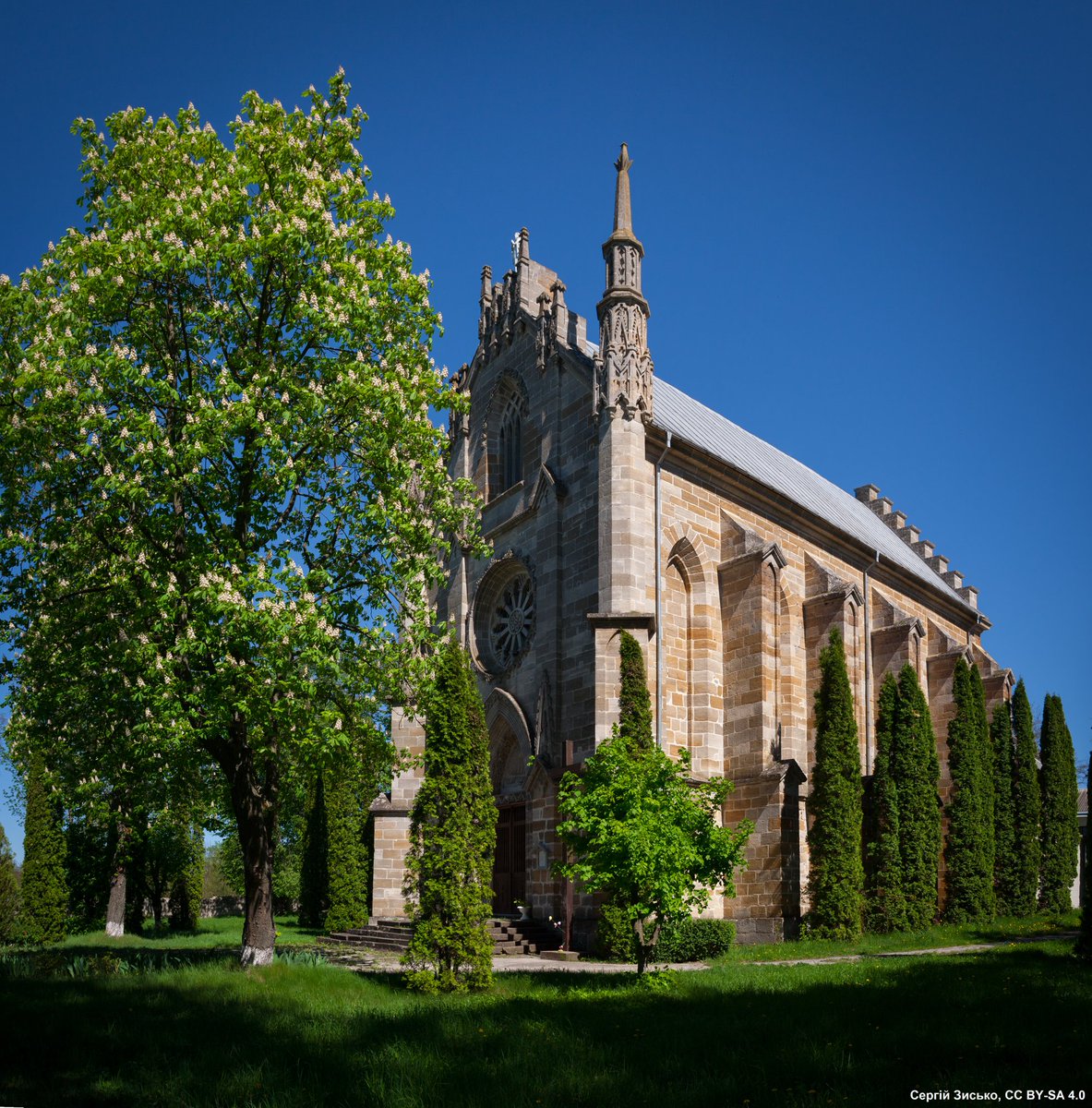Podillia, Dunaivtsi district, a village with less than 1000 inhabitants, total impassability ... But there is a church - an unsurpassed masterpiece of the neo-Gothic style. By looking at it we can surelz learn the basics of the Gothic architecture style. Gothic and high-quality neo-Gothic sometimes occur in Podillia: Losiach, Skala nad Zbruchem, Chortkiv, Bar, the cathedral in Kamianka. Nevertheless, if there is a similar masterpiece, it must be the one in Ozeriany. Next to Pidlisnyi Mukarov is the Maliivtsi village - one of the most picturesque corners of Podillia. There is also no usual road, but you have to get there.

Pidlisnyi Mukariv is mentioned in historical sources in the early 15th century as a royal land that was part of the Bar principality. In the middle of the 17th century it was already the center of villages' council , which included 7 villages. At the turn of the 18th and 19th centuries, Carolina Gozdska, the wife of the French Prince Charles de Nassau-Siegen, ruled the council. After her, Pidlisnyi Mukariv was rented by the secretary of the Russian embassy in France, Pavel Butiagin.

Neo-Gothic masterpiece of Podillia - the church of St. Jusuf Obrucnik was built during 1859-1872. The initiator of the construction was the priest Basil Shakh, and the church was built at the expense of the parishioners. The church was consecrated in 1886 by Bishop Liubovidskyi. The Soviet occupants closed the church twice - in 1933 and in 1962. In 1989, the church was returned to the Roman Catholic community, after which it was restored. The church was plastered, the interior was painted, the altar and the organ were reconstructed and re-consecrated in 1992.

Today the church is used by a small Roman Catholic community of Pidlisnyi Mukarov and surrounding villages. It is obvious that it is very difficult for the priest to maintain the church in proper condition. He says that the Poles are also not helping yet. But so far he is coping with this problem.

The church has many typical Gothic-style attributes - a rose-type window, vials with crucifers, vimpergs. Everything is indeed harmoniously connected.



On the northern facade is written the year of the temple construction:

No less impressive are the interiors of the temple:

Organ:

Altar:


Arch-see:

Wooden details:

Church and bell tower:

Temple fence:

 Pidlisnyi Mukariv is mentioned in historical sources in the early 15th century as a royal land that was part of the Bar principality. In the middle of the 17th century it was already the center of villages' council , which included 7 villages. At the turn of the 18th and 19th centuries, Carolina Gozdska, the wife of the French Prince Charles de Nassau-Siegen, ruled the council. After her, Pidlisnyi Mukariv was rented by the secretary of the Russian embassy in France, Pavel Butiagin.
Pidlisnyi Mukariv is mentioned in historical sources in the early 15th century as a royal land that was part of the Bar principality. In the middle of the 17th century it was already the center of villages' council , which included 7 villages. At the turn of the 18th and 19th centuries, Carolina Gozdska, the wife of the French Prince Charles de Nassau-Siegen, ruled the council. After her, Pidlisnyi Mukariv was rented by the secretary of the Russian embassy in France, Pavel Butiagin.
 Neo-Gothic masterpiece of Podillia - the church of St. Jusuf Obrucnik was built during 1859-1872. The initiator of the construction was the priest Basil Shakh, and the church was built at the expense of the parishioners. The church was consecrated in 1886 by Bishop Liubovidskyi. The Soviet occupants closed the church twice - in 1933 and in 1962. In 1989, the church was returned to the Roman Catholic community, after which it was restored. The church was plastered, the interior was painted, the altar and the organ were reconstructed and re-consecrated in 1992.
Neo-Gothic masterpiece of Podillia - the church of St. Jusuf Obrucnik was built during 1859-1872. The initiator of the construction was the priest Basil Shakh, and the church was built at the expense of the parishioners. The church was consecrated in 1886 by Bishop Liubovidskyi. The Soviet occupants closed the church twice - in 1933 and in 1962. In 1989, the church was returned to the Roman Catholic community, after which it was restored. The church was plastered, the interior was painted, the altar and the organ were reconstructed and re-consecrated in 1992.
 Today the church is used by a small Roman Catholic community of Pidlisnyi Mukarov and surrounding villages. It is obvious that it is very difficult for the priest to maintain the church in proper condition. He says that the Poles are also not helping yet. But so far he is coping with this problem.
Today the church is used by a small Roman Catholic community of Pidlisnyi Mukarov and surrounding villages. It is obvious that it is very difficult for the priest to maintain the church in proper condition. He says that the Poles are also not helping yet. But so far he is coping with this problem.
 The church has many typical Gothic-style attributes - a rose-type window, vials with crucifers, vimpergs. Everything is indeed harmoniously connected.
The church has many typical Gothic-style attributes - a rose-type window, vials with crucifers, vimpergs. Everything is indeed harmoniously connected.


 On the northern facade is written the year of the temple construction:
On the northern facade is written the year of the temple construction:
 No less impressive are the interiors of the temple:
No less impressive are the interiors of the temple:
 Organ:
Organ:
 Altar:
Altar:

 Arch-see:
Arch-see:
 Wooden details:
Wooden details:
 Church and bell tower:
Church and bell tower:
 Temple fence:
Temple fence:







